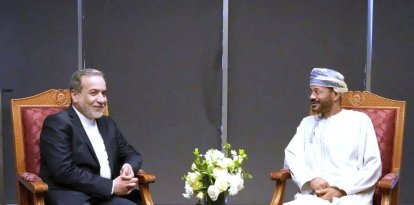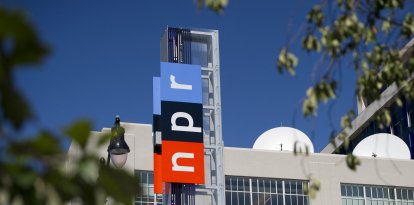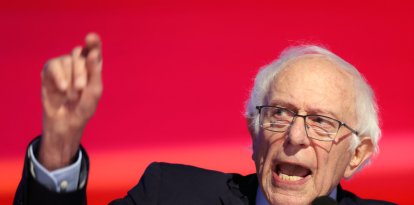Jewish anti-Zionists can’t be part of our ‘big tent’ community
Those who seek Israel’s elimination aren’t “criticizing” Israel. They have joined forces with genocidal Islamists who justify Oct. 7 and the murder of Jews.

Israelis celebrate the killing of Hamas leader Yahya Sinwar/ Jack Guez
Historical memory lies at the heart of most Jewish holiday commemorations. During Sukkot, for example, Jews daily welcome ushpizin—“guests” or ancestors, including the patriarchs of Judaism—into their sukkahs, which themselves are a remembrance of the post-Exodus wanderings of the Jewish people in the desert. It is just one example of how identification with the past is very much part of the present. It also emphasizes the collective fate of a people on their way to their homeland, where shelter would hopefully no longer be a function of impermanent huts open to the stars. On Sukkot, we not only invite guests into our homes; it is a way we connect ourselves with that journey to Israel.
But for a small though noisy minority of contemporary American Jews, the fate of other Jews and Israel is no longer a matter with which they concern themselves. As a consequence, it is now more imperative than ever for Jews to stop pretending that one can join those chanting “from the river to the sea” and “globalize the intifada”—slogans that justify and encourage the genocide of the Jews of Israel—and still be considered part of the Jewish community.
Anti-Zionists may be considered Jewish according to religious law as well as mainstream by The New York Times. But in the post-Oct. 7 world, it should no longer be possible to pretend to speak for Jewish values or tradition, or to be part of the Jewish world, while opposing the right of the one Jewish state on the planet to exist and defend itself. That is true whether those who take that position explicitly—as do Jews who join the pro-Hamas demonstrators in America’s streets and on college campuses—or who merely rationalize their efforts from the sidelines or on the platforms provided to them by the liberal mainstream media.
The debate is over
The debate about Zionism in the Jewish world was once a vigorous one. In the first half of the 20th century before the Holocaust and the establishment of the modern-day State of Israel in 1948, Jews were divided about its merits. Some in the Diaspora, particularly among the wealthy and most secure in places like the United States and Britain, feared their rights would be compromised by a Jewish state existing somewhere else. Socialists, primarily in the Bund movement, preferred to work for the establishment of their idea of a utopian future in which Jewish rights and autonomy would be respected, particularly in Eastern European lands where Jews were numerous. Many religious Jews also feared that anticipating the Messianic Age—in which the ancient kingdom of Israel would be restored along with the Holy Temple in Jerusalem—was sinful.
The verdict of history on those critics of Zionism was brutal.
Bundism died in the flames of the Shoah and the horrors of totalitarian communism in the Soviet empire, where Jews were persecuted even more than they had been by Russia’s tsars. And while most ultra-Orthodox Jews don’t call themselves Zionists, they have recognized that Israel’s existence has provided the security and the financial support that has enabled them to flourish in ways undreamed of a century ago, even if their opting out of the economy and the obligation to serve in the Israel Defense Forces has created social strife with other Jews. Only a tiny minority of haredim still actively oppose Israel’s existence.
The point being is that while Zionism was a hypothetical during the lifetime of movement founder Theodor Herzl and the four decades after his death in 1904, that is no longer true. Israel is not an idea. It is a country of almost 10 million people with a thriving democracy and a Jewish majority that numbers approximately 7.2 million.
Just as important, the verdict of history about the security of Jewish minorities, both in the Muslim and Arab world where they were considered dhimmi, as members of a discriminated minority and outside of a few Western democracies elsewhere, is similarly conclusive. After the experience of two millennia of exile culminating in the Holocaust, the idea that Jews can collectively depend on the kindness of strangers is no longer viable.
One day that changed everything
Moreover, after Oct. 7, the overwhelming majority of even those Jews who dreamed of some kind of coexistence with the Palestinians involving two states understand that Jewish survival is not imaginable without a strong State of Israel that can defend its people. The Palestinian massacre of Jews in southern Israel that took place a year ago was merely a trailer for what they intended for the entire Jewish population. The same is true for the invasion of northern Israel by Hezbollah terrorists that was thwarted by the IDF offensive in Lebanon.
While this was apparent even before Oct. 7 to those who paid attention to Palestinian discourse, these events changed everything about this discussion.
Simply put, if you oppose Israel and think the arguments of those who call for its destruction are persuasive, then you are putting yourself on the side of those who engaged in an orgy of mass murder, rape, torture, kidnapping and wanton destruction a year ago, as well as those who wish to repeat it on an even larger scale.
While Zionism was considered a debatable idea a century ago, today it is something very different. It is not an accident that those who wish to destroy Israel oppose the working definition of antisemitism provided by the International Holocaust Remembrance Alliance, which includes examples of anti-Zionism.
Israel is the only country in the world that has generated an international movement to destroy it, despite it being the only democracy in the Middle East. Those who wish to deny Jews rights, such as the ability to live in peace and security and to defend themselves in their ancient homeland, are advocating discrimination and are connecting themselves to the world’s oldest hatred. Thus, those who support discrimination against Jews are promoting antisemitism.
Yet somehow, identification with that evil cause and even the vile crimes of Oct. 7 is something that current intellectual fashion considers respectable opinion. As the reaction to Ta-Nehisi Coates’ new anti-Zionist book from the literary establishment shows, not even statements about a desire to participate in another Oct. 7 is enough to damage an African-American writer’s reputation or diminish the rapturous reception of his ignorant musings.
But perhaps the most troubling aspect of the post-Oct. 7 surge in antisemitism throughout the world and particularly in the United States is the way this cause has been embraced by some left-wing Jews.
What they wanted from young Jews
One person who has addressed this problem head-on is Rabbi Ammiel Hirsch, the senior rabbi of a flagship institution of the Reform movement: the Stephen Wise Free Synagogue on Manhattan’s Upper West Side. Hirsch has been speaking out eloquently in recent years about the problem of liberal Jews abandoning Israel. He did so again in a Yom Kippur sermon that centered on reactions to Oct. 7 that all Jews need to hear.
Hirsch pointed out that what has happened on the Jewish left is not what Reform leaders like himself had ever intended. They are deeply critical of the Israeli government and many of its policies. As he put it, they wanted their youth to feel compassion for Palestinians and to uphold principles of social justice. He said they wanted young Jews to take these positions from a position of kinship with fellow Jews and Israel. But that is not what has happened.
This is how he described the situation:
“What we did not intend is for some in your generation to turn your backs on our people. We wanted you to be Zionists. We did not intend that our emphasis on tikkun olam—social repair—would lead some Jews to join anti-Israel demonstrations. We did not intend for Jews to lead Passover seders in so-called “liberated zones” (liberated from Zionists) that not only violate university policies but also threaten the safety of Jewish students. Some of those protests contain anti-American sentiments as well. We did not intend to encourage or excuse Jews who burn American flags or support those who do. … We did not intend that criticism of Israeli policy to lead to detached indifference and a vacuous lack of compassion for the murdered, brutalized, sexually assaulted and kidnapped of our own people. We did not intend that some in your generation give not even a passing thought to the many tens of thousands of our people who have become refugees from their southern and northern homes. We did not intend to strip Jewish solidarity, empathy, responsibility and mutuality from your Jewish identity—not only towards Israeli civilians, but soldiers your age who exhibit astonishing courage and remarkable self-sacrifice, many of whom laid down their lives protecting our people in feats of enormous heroism.”
What happened was that the balance between the universal and sectarian aspects of Judaism went off-kilter and, as Hirsch said, the “Jewish spirit” that Jewish liberal leaders thought they were inculcating in their youth was allowed to “dribble away.”
That is why it is imperative that those who speak for movements like Reform Judaism speak out, as Hirsch has done, to make it clear that those who turn on their own people have, in effect, left the fold in a way that has led to real harm.
To some on the Jewish right, especially among the Orthodox, the response has been that the problem is not so much what liberal Jews did wrong as the whole idea of non-Orthodox Judaism. But that is not an approach that will do American Jewry any good. The fact remains that the overwhelming majority of Jews living in the United States identify with the liberal movements if they feel any connection to Jewish institutions at all. And despite the demographic decline of the liberal movements and the growth among the Orthodox, the gap between the two is so large that there is no possible scenario where these groups will be on equal footing for generations.
A common past and a common destiny
If we are to fight back against anti-Zionists who are recruiting Jews from the liberal movements into the ranks of groups like Jewish Voice for Peace and IfNotNow, which make common cause with those who make war on Israel and who traffic in antisemitism themselves, it can’t happen by merely writing off everyone outside of the Jewish religious and political right. The only way it will occur is by liberal Jewish institutions re-emphasizing the centrality of Israel and Zionism to their denominations and brands of Judaism.
The Jewish community need not agree on every point of observance or about politics, be it of the Israeli or American varieties. But we must agree on our common past and our common peril as antisemites—whether of the more dominant left-wing or of the right—threaten us all. And we must recognize that if we are to have a Jewish future in the Diaspora or in our ancient homeland, it can only be in a world with a strong and secure Israel.
Rabbi Hirsch speaks for all of the Jewish people when he notes the need for young Jews to remember our past and to acknowledge the perils facing us today. Those who side with the killers, rapists and kidnappers of Jews aren’t the product of liberal Jewish values. They are betraying them—and they must be told as much.
© JNS
RECOMMENDATION





















